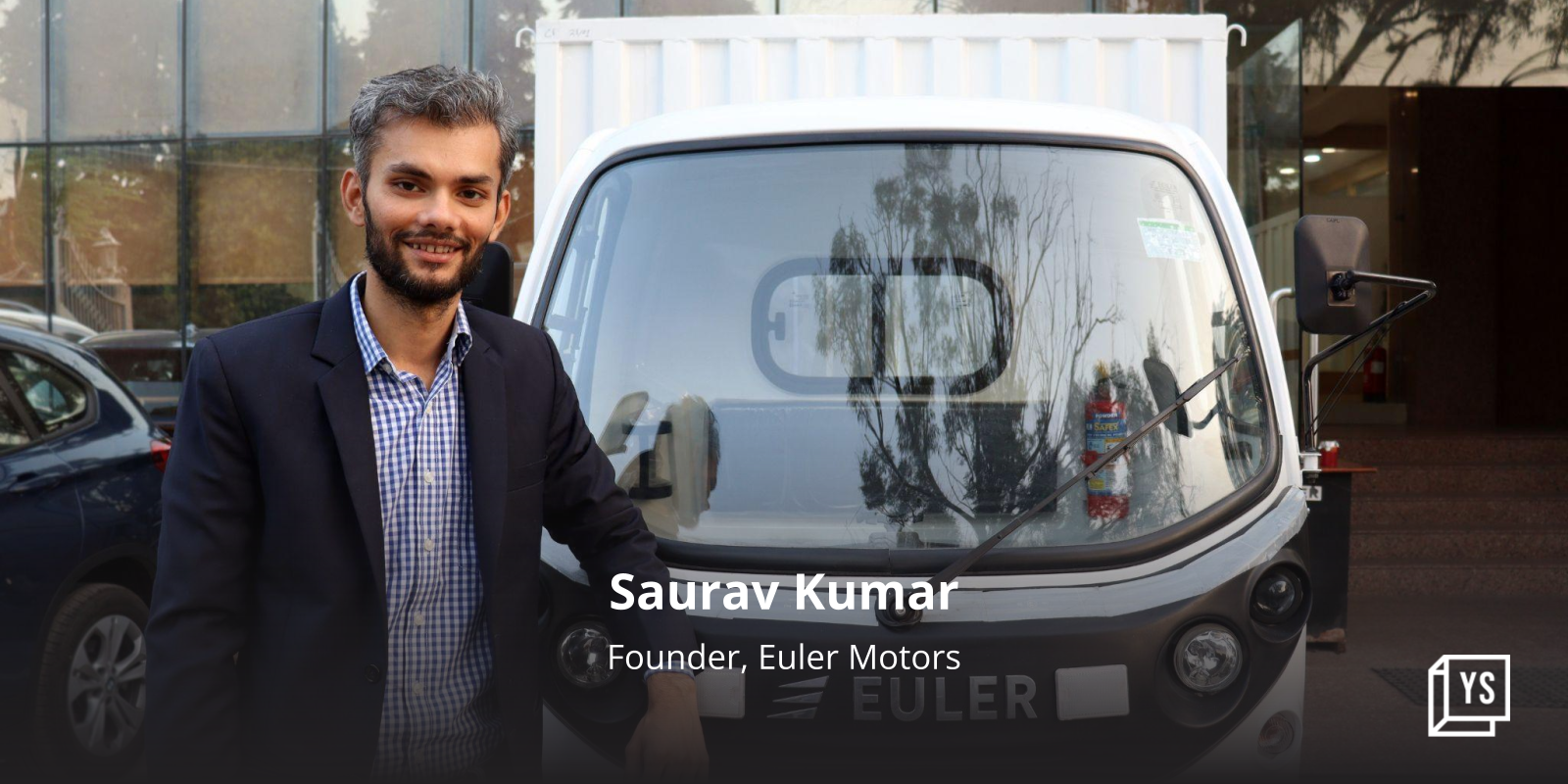Startup
Euler Motors’ net loss widens to Rs 227 crore in FY24

Electric commercial vehicle manufacturer has posted a net loss of Rs 226.9 crore for the financial year ended March 31, 2024, compared with Rs 175 crore earned in the preceding year.
The Delhi-based firm’s operating revenue soared by 3X to Rs 189 crore in FY24, up from Rs 62 crore in the previous fiscal year.
The cost of materials consumed, the company’s largest expense, rose by 187% to Rs 198 crore from Rs 69 crore in FY23, taking the total expense up by 75% year-on-year to Rs 420 crore in FY24.
The startup’s employee benefit expenses remained relatively unchanged, incurring Rs 54 crore in the year under review compared with Rs 56 crore in the prior year.
In May, Euler Motors raised an additional Rs 200 crore in its Series C funding round led by British International Investment (BII), , and new investor, Piramal Alternatives India Access Fund.
Earlier, in November last year, the company raised Rs 120 crore from British International Investment (BII) and Green Frontier Capital as part of its ongoing Series C extension. Existing backers, including Athera Venture Partners, Blume Ventures, GIC Singapore, and ADB Ventures, also joined the round.
In FY24, the company sold 3,700 vehicles and grew its footprint from five to 22 cities, it said in a statement. In August, Euler Motors also announced its entry into the small commercial vehicle segment, aiming to launch its first four-wheeler with a payload capacity exceeding 1,000 kg during the upcoming festive season.
Startup
PhysicsWallah’s losses widen FY24 as rising expenses overshadow 2.6X revenue growth

Edtech unicorn PhysicsWallah (PW) saw its losses widen significantly in FY 2023-24, fueled by a sharp rise in employee benefit costs and other expenditures, casting a shadow over a 2.6-fold increase in operating revenue.
The Noida-based company also revised its FY 2022-23 figures, now reporting a loss of Rs 84.1 crore, in contrast to the Rs 8.9 crore profit previously stated in its earlier consolidated financial statements.
The heavy losses come on the back of the edtech company’s rapid expansion over the past couple of years. PW, which initially focused on the test-prep segment, has rapidly diversified its educational offerings over the past few years to encompass everything—from school education to skills training—casting its learning net over a wide base of learners.
PW’s rapid expansion comes amid a turbulent period for BYJU’S, once the leading edtech platform and the poster child of the Indian startup ecosystem.
The Alakh Pandey-led firm reported a consolidated loss of Rs 1,131.3 crore in FY24, up 13.5X from Rs 84.1 crore recorded in the earlier fiscal period.
The reported losses were impacted by non-cash adjustments, such as Compulsorily Convertible Preference Shares (CCPS) amounting to Rs 756 crore, according to the company. This CCPS expense is recorded in relation to the buyback clause provided in the issued CCPS, based on the conversion of accounting standards from IGAAP to INDAS, it added.
After excluding the non-cash adjustment, the company’s actual cash losses come to approximately Rs 375 crore, up 4.4X.
The company had remained the only profitable edtech firm until FY22, while steadily growing its top line.
Its operating revenue surged 160.7%, touching Rs 1,940.4 crore in FY24 compared to Rs 744.3 crore in FY23, as per its recent consolidated financial statements.
The startup’s total income reached Rs 2,015.1 crore, up 160.8% increase year-on-year (YoY).
For context, BYJU’S surpassed the Rs 2,000 crore revenue mark in FY20 and Eruditus in FY23, while PW achieved this milestone in its fourth year of operations. BYJU’S was incorporated in 2011, Eruditus in 2010, and PW in 2020.
Meanwhile, the company’s expenses surged by 280.4% to Rs 3,279.1 crore in FY24 compared with Rs 862 crore in FY23.
The sharp rise in expenses was driven by employee benefits, the firm’s second-largest cost centre, which jumped to Rs 1,159 crore—a 180.9% YoY.
Its other expenses surged by 442.4% YoY to Rs 1,660 crore, including a significant increase in miscellaneous expenses, which rose by 755.9% to Rs 1,452.7 crore.
Interestingly, PW also reduced its advertising and promotional expenses by 39.9%, although these still accounted for the company’s second-largest expense, totalling Rs 37.3 crore in FY24 compared with Rs 62.1 crore in FY23.
PW has experienced impressive growth, however, sustainable growth and profitability are essential, and it must navigate its own challenges as it expands.
Earlier this year, PW Co-founder Prateek Maheshwari told YourStory that FY24 was the year of “growth,” while FY25 is the year of “sustainable growth,” as PW aims to return to a profitable path.
“We have bounced back this year, with the first two quarters being EBITDA profitable for the first time in our company’s history,” he added. EBITDA, or earnings before interest, taxes, depreciation and amortisation, is a measure of core operational efficiency.
While the profitability metric for FY25 cannot be determined due to the transition from I-GAAP to Ind-AS, this fiscal year is expected to be the highest in absolute EBITDA profitability since inception, according to Maheshwari.
I-GAAP (Indian Generally Accepted Accounting Principles) refers to the traditional accounting standards used in the country, while Ind-AS (Indian Accounting Standards) is a set of accounting standards aligned with IFRS (International Financial Reporting Standards) for greater transparency and consistency.
In September, PW raised $210 million in a Series B funding round led by investment firm Hornbill Capital, with a sizable participation from venture capital firm Lightspeed Venture Partners. This was a significant milestone given the scarcity of substantial deals in India’s edtech sector lately.
With the latest funding round, PW’s post-money valuation has soared to $2.8 billion, making it the third-most valued edtech firm, trailing only Unacademy ($3.4 billion) and Eruditus ($3.2 billion), based on their last valuations.
Startup
RenewBuys pares FY24 losses by 40% amid merger reports

D2C Consulting Services, the parent company of digital insurance startup RenewBuy, pared its losses by 42% to Rs 114.44 crore in FY24 from Rs 197.19 crore in the previous year.
The online insurance aggregator clocked 40% rise in operating revenue to Rs 394.40 crore from Rs 280.75 crore in FY23, according to a filing made with the Registrar of Companies.
D2C Consulting Services is reportedly in talks with its larger peer InsuranceDekho for a potential merger in a cash-and-stock deal. The combined entity is expected to be valued over Rs 8,000 crore, with RenewBuy valued at about Rs 3,000 crore.
The RenewBuy platform offers comparison for motor, health and life insurance. Its total expenses rose 8% to Rs 524.24 crore, mainly driven by higher interest payments and other expenses.
RenewBuy is valued at $364 million according to the data available on data intelligence platform Tracxn. It last raised $40 million in a Series D round from Dai-ichi Life Holdings in July 2023.
The startup was founded in 2016 by Balachander Sekhar and Indraneel Chatterjee. RenewBuy plans to expand beyond India, especially in the Asian markets.
Its peer PolicyBazaar, a unit of listed entity PB Fintech, reported a 43.81% year-over-year jump in operational revenue at Rs 1,167 crore in Q2. During the same period, it clocked a profit after tax of Rs 51 crore, marking a turnaround from a loss of Rs 21.11 crore incurred in the corresponding year-ago period.
Startup
Startup news and updates: Daily roundup (November 7, 2024)

Funding news:
Enlog secures Rs 1.75 Cr in equity funding
Enlog, a Delhi-based startup specialising in AI-powered energy management and IoT solutions, has secured Rs 1.75 crore in equity funding from Vinners.
The fresh funds will be used to boost its operations and accelerate its growth in India’s energy management sector.
Enlog, a Delhi-based energy management startup, was founded in 2019 by Bharath Rnkawat and Jharna Saha, focuses on IoT and AI-powered energy solutions to optimise electricity consumption and reduce carbon footprints. So far, it has managed 11,300 MWh of electricity and reduced over 2,000 tons of carbon emissions.
With over 15,000 users, Enlog aims to reduce carbon emissions by one million tons by 2027. It plans to triple its revenue from Rs 12 crore in 2024 to Rs 40-45 crore by 2025, focusing on expanding into key Indian metro cities like Bangalore, Hyderabad, Pune, and Indore.
Pulse bags $1.4M in a seed funding round led by Endiya Partners
, an advanced Agentic AI platform, has secured $1.4 million in seed funding from Endiya Partners, with participation from angel investors, including founders of Zluri and Yellow.ai, and other entrepreneurs and product leaders.
The funding will primarily focus on building a robust core team, enhancing the platform’s development, purpose-built LLMs, and Agentic AI capabilities.
It is launching its MVP in November 2024, following pilots with multiple design partners. The company plans to allocate resources for early go-to-market initiatives to establish a foothold in India and the US, paving the way for long-term growth and leadership in the AI-first product management space.
Hyderabad-based Pulse, founded in 2024, uses Agentic AI to collect customer feedback, analyse structured and unstructured data, and automate key processes like feature extraction, prioritisation, and product hierarchy creation.

Pulse Founders
Other News
DaveAI secures patent for real-time adaptive digital aisle, transforming customer engagement
, an interactive digital solutions, has been granted a patent by the Government of India for its “System and Method for Real-Time Adaptive Interactive Digital Aisle of Products.”
The patented system leverages DaveAI’s proprietary Affinity Engine, a multi-dimensional AI with an online learning genetic algorithm, powers real-time hyper-personalisation, allowing brands to craft adaptable and engaging digital customer experiences.
DaveAI combines machine learning with genetic algorithms to personalise customer interactions in real time. This allows brands to provide tailored recommendations, adapt to changing customer needs, and build lasting connections.
(The copy will be updated with the latest news throughout the day)
-

 Startup Stories1 year ago
Startup Stories1 year agoWhy Millennials, GenZs Are Riding The Investment Tech Wave In India
-

 Startup Stories1 year ago
Startup Stories1 year agoStartups That Caught Our Eyes In September 2023
-

 Startup Stories1 year ago
Startup Stories1 year agoHow Raaho Is Using Tech To Transform India’s Fragmented Commercial Trucking
-

 Startup Stories12 months ago
Startup Stories12 months agoMeet The 10 Indian Startup Gems In The Indian Jewellery Industry’s Crown
-

 Crptocurrency8 months ago
Crptocurrency8 months agoLither is Making Crypto Safe, Fun, and Profitable for Everyone!
-

 Startup Stories1 year ago
Startup Stories1 year agoHow Volt Money Is Unlocking The Value Of Mutual Funds With Secured Lending
-

 Startup Stories1 year ago
Startup Stories1 year agoWhy Moscow-Based Kladana Considers Indian SME Sector As The Next Big Market For Cloud Computing
-

 E-commerce1 year ago
E-commerce1 year agoTop Online Couponing Trends To Watch Out For In 2016




